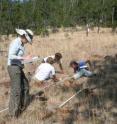Low elevations hold climate surprises
Contrary to expectations, climate change has had a significant effect on mountain plants at low elevations, says a new study led by a UC Davis researcher. The information could guide future conservation efforts at local scales by helping decision makers anticipate biological responses to climate changes, said lead author Susan Harrison, a UC Davis professor of environmental science and policy.
Harrison and scientists from the University of Wisconsin-Madison and the U.S. Geological Survey examined vegetation changes during the past 60 years in the Siskiyou Mountains of Oregon.
They found signs of increased drought stress in the low-elevation forests (1,650 to 4,000 feet), but not at high elevations (4,100 to 6,900 feet). Climate change appeared to affect both logged and unlogged forests at low elevations similarly.
"We were surprised to find such clear signals of climate change in these plant communities, given all the other ecological changes that may be going on in the region, such as logging and fire suppression," Harrison said.
Source: University of California - Davis
Other sources
- Low elevations hold climate surprises for mountain plantsfrom Science DailySat, 30 Oct 2010, 13:30:17 UTC
- Low elevations hold climate surprisesfrom Science BlogThu, 28 Oct 2010, 13:32:11 UTC
- Study: Mountain vegetation impacted by climate changefrom PhysorgMon, 25 Oct 2010, 21:50:18 UTC
